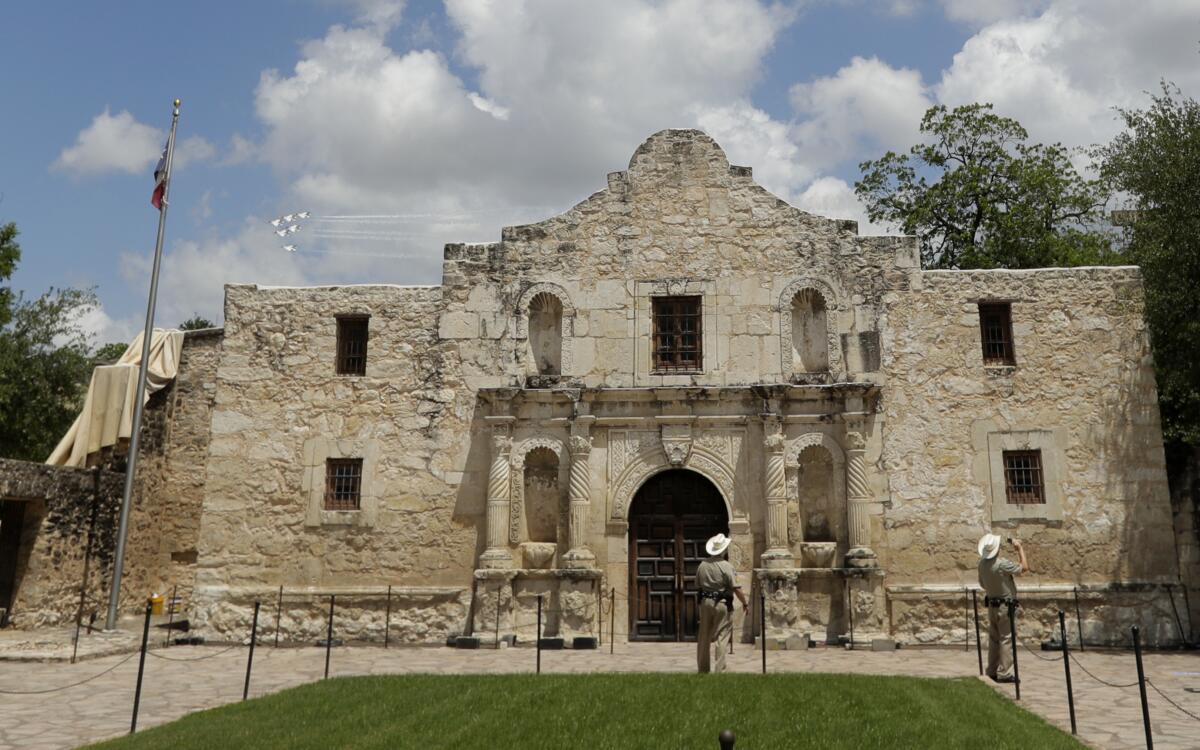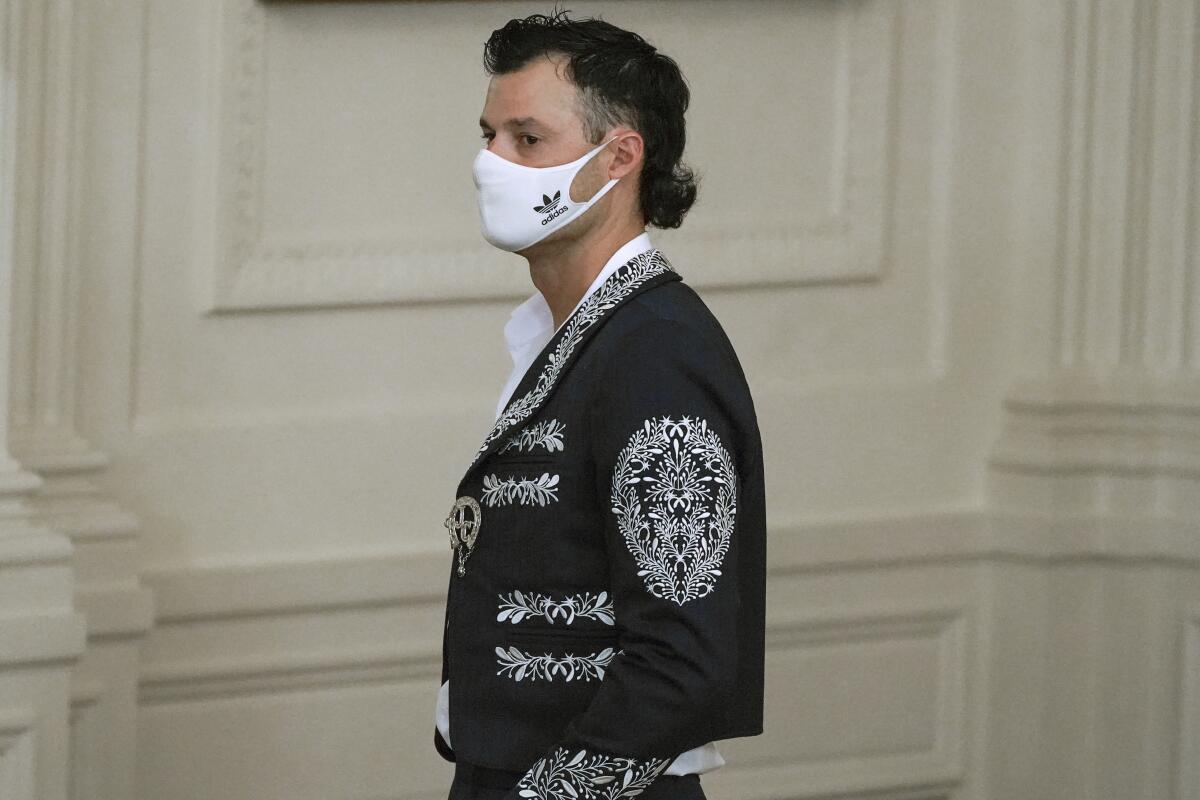Latinx Files: ‘Forget the Alamo’ and the difficulties in talking about this country’s complicated history

- Share via
Chris Tomlinson was driving to Austin when his phone rang.
The Houston Chronicle and San Antonio Express-News columnist was on his way to the Bob Bullock Texas State History Museum to promote “Forget the Alamo: The Rise and Fall of an American Myth,” a book co-written with Bryan Burrough and Jason Stanford that talks about the foundational role that slavery has in Texas history and the institutional efforts to whitewash that truth. You can read The Times’ review here.
Less than four hours before Thursday’s event was supposed to start, Burrough was calling to tell him the museum was pulling out. According to Penguin Press, their publisher, the museum had been “receiving increased pressure on social media about hosting the event.”
“We pretty much understood immediately that this was a political action by a state institution shutting down our ability to speak to an audience,” Tomlinson said.
The following day, Texas Lt. Gov. Dan Patrick, who sits on the State Preservation Board alongside Gov. Greg Abbott, took credit for the cancellation on Twitter.
That Patrick boasted of shutting down the book event isn’t surprising. He and Abbott have been staunch opponents of the notion that race and slavery are key components in an honest telling of U.S. history. In June, Abbott established “The 1836 Project,” an advisory committee aimed at promoting “patriotic education” (the committee’s name is an obvious play on the New York Times’ Pulitzer Prize-winning series “The 1619 Project”).
I spoke with Tomlinson on Saturday, two days after his Twitter thread on what happened went viral. This interview has been lightly edited for clarity.
You mention in the introduction of “Forget the Alamo” that you “stand on the shoulders of revisionist authors” whose work challenged the prevalent narrative of Texas history. Why, then, has there been backlash to your book and to the canceled event at the Bullock Texas State History Museum?
I just want to be clear, there is nothing original in our book prior to the reporting we’ve done over the last two years. Everything we wrote about prior to 2019 had already been covered by professional historians, and we have ample endnotes to support all of our assertions about the role slavery played in the revolution and how many of the myths around the Alamo are just not true.
I think Dan Patrick and the right wing saw an opportunity to use state power to censor a group of authors whose work the Texas Public Policy Foundation claims is the Texas version of “The 1619 Project,” and I could not be more flattered by the comparison. But if that is their presumption, then it follows that they will use state power to shut us down because that is their political campaign platform at this point. We’re caught up in the debate over the teaching of racism in this country and the teaching of current events. But at the end of the day, this is a violation of our 1st Amendment rights. It is the state practicing prior restraint on our speech, and therefore it’s censorship and it’s illegal.
Are you guys considering taking legal action?
We have asked the museum to invite us back and to reinstate the original event as it was planned. And if they fail to do so, then all of our options are open and legal action is part of it.
The controversy has no doubt resulted in unexpected publicity for the book. Have you seen an uptick in sales?
We don’t have any solid sales numbers, but we have been tracking our rankings on Amazon and Barnes & Noble. Prior to this, we peaked at No. 168 on Amazon following Bryan’s appearance on “Fresh Air.” As of this afternoon, we are No. 24 [as of this writing, the book is No. 46]. Last week before all of this happened, we were in the thousands, so yes, we have skyrocketed up the ranks. The response among freedom of speech defenders has been fabulous. They’re buying our book, and they’ll hopefully share the message in our book, which is that the way most people learn Texas history today is wrong and it needs to be fixed.
The Latinx experience chronicled
Get the Latinx Files newsletter for stories that capture the multitudes within our communities.
You may occasionally receive promotional content from the Los Angeles Times.
I’m from Texas, which means I was required to take Texas history in the seventh grade. The role of slavery was not mentioned in our textbook. It wasn’t until college that I learned about it, along with the long history of state violence against Mexicans and Mexican Americans. Why is this historical fact such a difficult topic to discuss in the education system and in public forums?
The middle part of our book tracks how Texas exceptionalism was dictated by the state Legislature when it was setting curriculum standards. We look at the specific historians who drilled down this idea that white Texans were a superior breed and therefore deserving of power and authority over everyone else. This was a systematic indoctrination.
Many Texans today, if you’re over 50 years old like me, remember growing up with these white supremacist-tinged legends and being told that we are special because our ancestors were special. Too many people have tied up their personal identities with the stories of their ancestors and these legends. I grew up that way. Then I discovered that my grandfather was a Klansman, that my great-grandfather was a Klansman who bragged about lynching people. I learned the truth, and that was what my first book was about. I grew out of that. I can now be my own man without relying on my ancestry for self-respect. But sadly, many Texans still need that. And that’s why they’re so threatened.
I’d be remiss if I didn’t bring up that Texas is increasingly becoming more and more Latinx.
This book came out of a column I wrote about the need for San Antonio and Texas to change their image now that non-Hispanic Anglos make up only 41% of the population. In a few short years, maybe by 2025, Latinxs will be the majority in Texas, and these old stories and myths do not work for them.
We spoke to dozens of San Antonians of Mexican American descent who talked about how hurtful the legends of the Alamo are, how they were made to feel un-American in seventh grade because their ancestors killed Davy Crockett. It’s the equivalent of accusing Jews of being Christ killers. It is a harmful, hurtful message. And that’s one of the main reasons we wrote this book.
What are the larger implications of what’s happening in Texas in terms of the way that we talk about history?
The conservative backlash that we’re seeing from Gov. Abbott and Lt. Gov. Patrick to critical race theory, which has led them to establish “The 1836 Project” to begin propagating patriotic education and banning books like ours, is just the beginning of what’s going to be a larger and more divisive battle. But, you know, I can’t see where the white supremacist myths can win with a much better informed, younger population that’s more diverse. I think we’re just at the beginning of a fight, but I think you can just look at the numbers on each side and you know who’s going to win.
Consider subscribing to the Los Angeles Times
Your support helps us deliver the news that matters most. Become a subscriber.
Things we read this week that we think you should read.
— For “The Times” podcast, Gustavo Arellano spoke with Sen. Alex Padilla, who this year became the first Latinx senator from California after being appointed by Gov. Gavin Newsom to replace Kamala Harris. Not signed up for the podcast? Apple Podcasts users can do so here, and if you use Spotify, you can subscribe here.
— My colleague Brittny Mejia wrote this heartbreaking story on José Tomás Mejía, an immigrant from El Salvador killed in the apartment complex he called home.
“His dream was snatched away in a cowardly way. We can’t understand it,” his brother Fermín Pineda said. “For me, José Tomás Mejía is not just a name. It’s the title of a story. The title of a book. Because there’s so much to tell about him.”
— Chef Gordon Ramsay was recently in Puerto Rico, where he tried to make pegao. As chef, TV personality and friend of the Latinx Files Alejandra Ramos explains for “Today,” Puerto Ricans did not take kindly to Ramsay botching this beloved dish.
— Latinxs are twice as likely to live in areas most threatened by wildfires as the overall U.S. population, according to Politico. A major factor is the lack of affordable housing, which has forced people to move to more remote, fire-prone areas.
— Among the people to have died because of the heat wave that struck the Pacific Northwest last week was Sebastian Francisco Perez, an agricultural worker from Guatemala who died one day after his 38th birthday while working at a nursery near St. Paul, Ore. A GoFundMe campaign has been set up to support his family.
— In her first column for The Times, deputy Sports editor and fellow Texan Iliana Limón Romero wrote about ESPN’s poor track record with journalists of color and how these failures were at the root of the recent controversy involving Rachel Nichols and Maria Taylor. Of course, these issues aren’t unique to the worldwide leader in sports, or to journalism for that matter. From Iliana’s commentary:
The overwhelming majority of journalists of color have heard a form of this attack relayed either to their faces or behind their backs. You filled their quota. You are the diversity hire. You are only here because of your gender or race.
It can come in the form of jokes and sometimes is leveled casually, as if it isn’t a bomb that can wreck the target’s confidence or push them to take on more work in an effort to prove their worth.
The best thing on the Latinternet: Mariachi Joe

The Los Angeles Dodgers were at the White House on Friday to be honored for winning the 2020 World Series. Joe Kelly showed up wearing a charro jacket.
The Athletic spoke to Grover Castro, the trumpeter for Mariachi Garibaldi who traded his jacket to the relief pitcher in exchange for his jersey at a home game two Sundays ago. Castro had no idea what would happen next.
“I was like, nah, this can’t be real,” he said.
“I had jokingly told my sister, ‘It would be cool if [Kelly] wore it for an interview.’ The fact that he’s wearing it in the White House is way more than an interview. That’s just incredible. Man, I couldn’t believe it.”
But wait, there’s more! Kelly, whose mother is Mexican American, recently said that he had forgotten about the White House trip, and had worn the jacket because he had it with him. Kelly even borrowed a pair of Mookie Betts’ pants.
The Latinx experience chronicled
Get the Latinx Files newsletter for stories that capture the multitudes within our communities.
You may occasionally receive promotional content from the Los Angeles Times.







